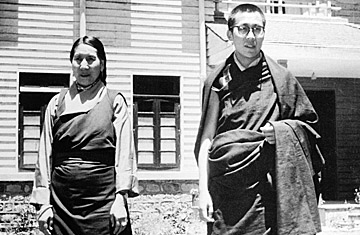
May 28, 1959: Tenzin Gyatso, the 14th Dalai Lama, and his mother, shortly after the Tibetan Buddhist ruler fled his homeland for exile in northern India
(4 of 9)
Finding the Dalai Lama proved easier than getting him home to Lhasa. The Chinese warlord of Tsinghai demanded $30,000 before he would let the boy leave. Glumly, the lamas paid it and set out for Tibet. They were stopped at the border. The warlord wanted more money, and it took two years of negotiations and a further payment of $90,000 before the Dalai Lama, by then four years old, could go in triumph to the palace of Potala.
Polygyny & Prayer. The Tibet he would one day rule is a preserved relic of ancient oriental feudalism. Twice as large as Texas, lying in the very heart of Asia, it is a land of mountains and craterlike valleys that seem to have been ripped from the moon. Its people are handsome, cheerful and indescribably dirty. About four-fifths of them work to support one-fifth, who are shut up in lamaseries. What little land is not owned by the monks belongs either to the Dalai Lama or to about 150 noble families, who have kept their names and acres intact down the centuries by a mixture of polygyny and polyandry. To safeguard their ancestral estate, three brothers will often share a single wife, and all children are considered to be fathered by the eldest of the brothers. Recently, a highborn Lhasa woman was simultaneously married to a local nobleman, to the Foreign Minister of Tibet, and to the Foreign Minister's son by another wife.
Religion is lived by all the people. Hundreds of lamaseries house thousands upon thousands of monks and nuns whose days are spent in meditation and prayer. There are nearly as many Living Buddhas as there are lamaseries, including one female incarnation whose name translates as "Thunderbolt Sow." Prayer is everywhere, on the lips of men and on flags and bits of paper stamped with woodblock imprints of the sacred words: "Om mani padme hum [Hail, the jewel in the lotus)." The phrase flutters from tall poles outside villages, from trees and cairns; it is stuffed inside the chortens' hollow towers at crossroads, and revolves constantly in the prayer wheels in every temple, nearly every house. There is gold in Tibet that cannot be mined for fear of offending the gods of earth, though panning gold from the river beds is permitted.
When a Tibetan dies, his body is carried to the top of a mortuary hill, hacked into pieces by body breakers and left to be picked clean to the bone by scavenger birds and beasts. Tibetan sons keep their fathers' skulls and use them as drinking cups out of filial piety. On stormy days, when blizzards smother the high mountain passes, lamas cut out paper horses and scatter them to the winds to carry help to any poor traveler foundering in the deep snow. Meeting a stranger, a Tibetan sticks out his tongue in friendly greeting.
